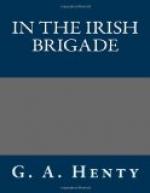“I suppose, by what I have seen of him, that he must be somewhat wearisome,” Phelim O’Sullivan said, with a laugh. “Fortunately, wit and gaiety are not essential qualities on the part of a monarch; but I must own that, treasonable as it may sound, I fear His Majesty is lacking in other qualities, far more essential in a monarch. I should say that he is kindly and well disposed, he wishes to be fair and just, and may turn out a wise ruler; but he is altogether deficient in energy. I suppose there is no occasion for a king, safely seated upon a throne, to be energetic; but a prince in exile should possess the qualities that excite enthusiasm, and bind men to him. Possibly, the qualities King James possesses would be highly valued by the Scotch, but they would certainly fail to inspire our people.”
“Yes,” Patrick O’Neil agreed. “His father did more to ruin his cause, in Ireland, than all William’s Dutch generals and troops, together. It was disheartening to be risking life and possessions for a man who would do nothing for himself, whose indecision paralysed our leaders, and who, the moment a reverse came, sought safety in flight, instead of taking his place among the men who were devoted to his cause. I can understand that, in England, where the majority of those who professed to be devoted to him were betraying him, and were in secret communication with William, he should be by turns obstinate and vacillating; but in Ireland, where every man who surrounded him was risking his life in his cause, he should have shown absolute confidence in them, listened to their advice, set an example of personal gallantry and courage, and, at least, remained among them until all was definitely lost. It was the desertion of James, rather than the loss of the battle of the Boyne, that ruined his cause.
“Well, I am glad you are out of it, for it was a pity that you should be going without your work at the salle d’armes, when you were making such progress that, the master reported, in a few months you would become one of the best swordsmen in the regiment.”
There were, in Paris, many Irish officers besides those belonging to Colonel O’Brien’s regiment. These were, for the most part, men who had been severely wounded in the preceding campaign, and who now remained in the capital with the depots of their regiments. These were constantly recruited by fresh arrivals from Ireland, by which means the Irish Brigade was not only kept up to their original strength, in spite of the heavy losses they suffered, in the engagements in which they had taken part, but largely increased its force, new regiments being constantly formed. Naturally, O’Brien’s corps, being the only complete regiment in Paris, at the time, was regarded as the headquarters and general meeting place of all the Irish officers there; and, as some of these had campaigned in Flanders, in Italy, and in Spain, Desmond learned, from their talk and anecdotes, far more of the doings of the Brigade than he had hitherto known. From the first they had, by their reckless bravery, in almost every engagement that had taken place, so distinguished themselves that they received the highest commendation from the French generals, and were almost invariably selected for specially dangerous service.




